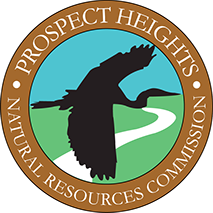Prospect Heights Natural Resources Commission
























Venue Change - Due to Covid-19 this will be a virtual Zoom presentation. Upon registration, you will be sent a link to the event as it gets closer to the date.
January 28th, 2021 - Chris Helzer
7:00-8:30 PM - “All the Little Things”.
Please join us as we welcome Chris Helzer, author of The Prairie Ecologist blog and the Director of Science for the Nature Conservancy in Nebraska for his presentation, "All the Little Things".
When people think about nature, they tend to focus on the big charismatic animals we learned about as children. However, ecosystems function because of much smaller organisms, including plants and invertebrates (and many others).
Those ‘little things’ and their complex interactive networks are worth knowing and appreciating. This photo-heavy presentation will introduce you to some of those little creatures, including a diversity of plants, ants, grasshoppers, plant hoppers, and much more, and explain how they form and maintain resilient and healthy ecosystems.
Do you know how many species of sunflower or milkweed live in nearby natural areas? The diversity within these plant groups is a critical part of ecological resilience. Each species of sunflower, milkweed, or other groups of plants, has its own growth, reproductive, and survival strategies. That means there are milkweed and sunflower plants found in many different habitat types, providing food and other resources for animals that depend upon them. It also means that in years of drought, late freezes, disease or insect outbreaks, or other stresses, some species of sunflower or milkweed might fare poorly but others will thrive and help ensure those important resources are still available.
Pollination is an essential process in prairies and other ecosystems. You might be surprised to learn that honey bees play a very minor role in the pollination of most wildflowers and, in fact, are likely more of a problem than a benefit. The bulk of pollination is done by something like 5,000 native species of bees, but also by many species of flies, wasps, butterflies, moths, and even some beetles and bugs.
The diversity of those pollinator species is the key to success for both the plants the rely on insect pollination and the insects themselves – not to mention all the other species that rely on diverse and productive plant communities.
In addition to pollinators, grasshoppers, ants, flies, and all other groups of invertebrates include an incredible diversity of individual stories and strategies. Just as with sunflowers, milkweeds, and bees, that diversity leads to resilience. The individual stories of species are fascinating. The interactions between them are even more amazing. Bison, eagles, and elk are pretty neat too, but it’s the little things that make nature thrive.
Chris Helzer is the Director of Science for The Nature Conservancy in Nebraska. His main role is to evaluate and capture lessons from the Conservancy’s land management and restoration work and then share those lessons with other landowners – both private and public.
In addition, Chris works to raise awareness about the importance of prairies and their conservation through his writing, photography, and presentations to various groups. Chris is also the author of "The Ecology and Management of Prairies in the Central United States", published by the University of Iowa Press. He lives in Aurora, Nebraska with his wife Kim and their children.